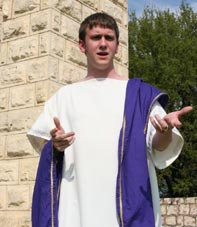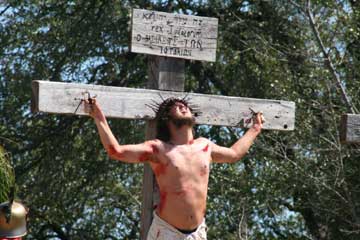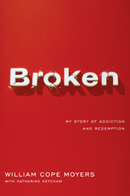Posted: 3/14/08
Will evangelical center emerge
to rival waning Christian Right?
By Greg Warner
Associated Baptist Press
JACKSONVILLE, Fla. (ABP)—If the Religious Right is losing its influence, as many pundits predict, will it be replaced by the “other” evangelicals—a center-and-left coalition with a broader social agenda and a kinder, gentler brand of cultural engagement?
Advocates say centrist evangelicals are a bona fide constituency that is re-emerging after three decades spent underground—or at least ignored by the media and society at large.
Although these other evangelicals have no dominant spokespersons and no representative organization, at least not yet, they say they are every bit as worthy of the “evangelical” label as their counterparts on the right—and every bit as numerous.
In fact, Christians can “be more evangelical by being less conservative,” argues Baptist theologian and author Roger Olson. And he’s written a book to tell them how.
“Evangelicals are leaving the Religious Right in droves,” added Christian activist Jim Wallis, for three decades the social conscience of the evangelical left. “This evangelical center is getting so big.”
So, how many evangelical centrists are out there?
Political scientist John Green, the preeminent researcher on evangelical politics, concluded 10.8 percent of American voters in 2004 were in the evangelical center, compared to 12.6 percent of voters on both the evangelical left and evangelical right.
But that doesn’t include African-American and Latino evangelicals, about half of whom are centrists. And those numbers likely have swelled in recent years, if Wallis and others are correct about the exodus on the right.
Driving the shift among evangelicals is “the refusal of the center or the left to confine moral values to abortion and homosexuality,” said ethicist David Gushee, who insists researchers and reporters err by grouping evangelicals into “bipolar” camps of left and right.
That shift is sped by the generational transition also taking place in society, said Gushee, a centrist Baptist who teaches at Mercer University and its seminary, both located in Georgia. The students he meets today, even at conservative Christian colleges, are more likely to campaign against sex trafficking, torture and environmental abuse than abortion or gay rights, Gushee said. And they’re fed up with the right’s “slash and burn” approach.
“The younger generation is definitely turned off to the culture-war mentality and all the anger,” he said. “They believe it violates the Spirit of Christ.”
Gushee, Wallis and Olson all have new books coming out about the emerging evangelical center and its broadened social agenda.
All three say faith steers the political views of moderate and progressive evangelicals— particularly young adults—to include a varied pallet of issues: poverty, war and peace, care of the environment, immigration reform, AIDS, lingering racism, torture, support for human rights, genocide in Darfur, and other social issues the Religious Right has largely avoided.
In a January poll by Beliefnet.com, self-described evangelicals ranked poverty, the environment, health care, education, the economy, governmental reform, and ending torture and the Iraq war as more important issues than abortion or gay marriage, the right’s two hot-button issues. And, perhaps most surprising, a majority of survey respondents were conservative.
A similar result came from a 2006 Zogby International poll of voters in the mid-term elections. Those voters said “kitchen table” issues—the economy, Iraq, poverty and greed —mattered more than abortion or gay marriage. Fewer than 9 percent of voters named abortion or gay marriage as the top moral issue. And the number of religious Americans who voted Democratic in 2006 increased significantly over 2004.
“If Christians are still reading the Bible seriously, and they’re reading it from Genesis to Revelation, then it’s impossible to ignore the broader issues,” said Gushee, who says the evangelical center is growing and will set the tone for Christian cultural engagement in the future.
“A historic shift is occurring,” Richard Cizik, vice president of the National Association of Evangelicals, said in a Scripps-Howard interview. “It is equivalent to an earthquake in slow motion—people aren’t sensing it.”
Cizik, the NAE’s progressive VP for governmental affairs, has himself been the target of evangelicalism’s old guard—such as Focus on the Family founder James Dobson—who accuse him of distracting evangelicals’ attention from the bread-and-butter issues of abortion and homosexuality.
The 2008 presidential election is demonstrating that religious voters are anything but monolithic. New surveys from the Pew Forum and the Barna Group suggest evangelical voters are in play for Democratic candidates Barack Obama and Hillary Clinton, both of whom are professing Christians with social agendas mirroring the new, broader evangelical definition of public morality.
Conservative evangelicals insist their obituary is premature. While they remain uneasy with their presidential options, they still carry weight in the electorate—particularly in the Republican Party. And they expect to have an impact on the presidential election.
But clearly the landscape has changed since the early days, when Jerry Falwell prayed publicly for God to speed the death of “liberal” Supreme Court justices.
“The Christian Right has made some mistakes and has been declining and is losing its market,” said Gushee, the author of The Future of Faith in American Politics. “The classic sex-and-abortion agenda is not resonating in this election season. And their ability to direct foot soldiers is declining.”
The shift to the center, if indeed it is one, is not entirely new, Olson said. In How to Be Evangelical Without Being Conservative, he argues that historically evangelicals—rather than being dependable stalwarts of the conservative status quo—often have been radicals on doctrinal and social issues like worship and slavery.
A professor of theology at Baylor University’s Truett Theological Seminary, Olson is a “Northern evangelical” transplanted to the South. He calls himself a “post-conservative evangelical” and staunchly refuses to surrender the term “evangelical” to the right wing.
“We are evangelical, and we have every right to be called that,” he said. But he admits he and his cohorts have a public-relations problem. “Those of us who are not conservative need someone who is famous who can come on radio and TV and nuance things.”
It is possible to be evangelical and be liberal socially, Olson maintains. For instance, he argues, a Christian can be patriotic without succumbing to nationalism, can favor the redistribution of wealth without being a socialist, and can innovate in worship without trivializing it.
The term “evangelical” has a rich history that predates the Religious Right, Olson says, but “it is a very problematic term right now” for those who don’t consider themselves fundamentalist or conservative.
“Many ‘former’ fundamentalists are calling themselves theological evangelicals,” he said, citing Jerry Falwell Jr., the 47-year-old chancellor of Liberty University, founded by his fundamentalist father.
And he concedes that centrists may lose the battle over language: “I don’t want to say that conservatives will win, but they are winning.”
Besides the often-pejorative nature of the term, Olson and Wallis say they also have a problem with the political language of right, left and center. “They are so tied to the Enlightenment,” Olson said. “‘Post-conservative’ means I want to be off that spectrum.”
In his new book, The Great Awakening, Wallis, founder of a faith and justice network called Sojourners, prefers the terms “moral center” and “gospel center,” trying to lift Christians above the political fray.
The three authors also use different criteria to define “evangelicals.” Wallis and Gushee employ theological definitions of evangelicals that focus on core beliefs. Olson prefers an “experiential” definition—evangelicals are “God-fearing, Bible-believing, Jesus-loving” Christians, he says.
Many historians don’t use “evangelical” to describe Baptists because their history did not intersect with American evangelicals, who grew as a moderate response to early-20th century fundamentalism. But Olson and Gushee embrace it.
They are both Baptist, but they come from different historical streams. Olson grew up in a Pentecostal family and later became a Baptist in the North. Gushee is a former Roman Catholic. Both work for progressive universities with Southern Baptist roots.
“Most moderate Baptists are center or center-left evangelicals, they just don’t know it,” Gushee said. “I want to help moderate Baptists reclaim the term ‘evangelical’ and re-associate with other evangelicals who are kindred spirits, if they only knew it.”
Evangelicals in the northern United States are willing to work across denominational lines, Olson added. “In the North, we evangelicals get together with anyone who looks fondly upon the cross.”
Sharp theological lines are less important in the North because Christians are a minority, he said. A “Jesus-centered piety” is common-enough ground for fellowship. “I think most Baptists in the town I grew up in would be part of that. But Baptists in the North are so fragmented, it’s hard to classify them.”
Gushee said the recent New Baptist Covenant meeting, which drew an estimated 15,000 moderate-leaning Baptists of different races and traditions to Atlanta, is a healthy sign of the growing strength of centrists.
But Covenant organizers say their movement will not become a denomination or institution. Likewise, other centrist evangelicals—scattered in dozens of denominations—have no organizational identity or rallying point. The National Association of Evangelicals currently is fragmented over its identity and focus.
“What’s needed is a new national organization that is truly centrist and truly viable,” Olson said. “The NAE could be that, but it has lost some steam. … I’m still hopeful about the NAE.”
Will evangelicalism’s new “middle” hold without some structure? There’s more hope than certainty among its advocates.
One observer, historian Bill Leonard, dean of the Wake Forest Divinity School, is skeptical a middle can emerge within evangelicalism because the movement is already so divided, pitting one vision of “orthodoxy” against another.
“‘Middle ways’ may not be a luxury that evangelicalism can afford in the years ahead,” he said.
Meanwhile, don’t look for the Religious Right to collect its marbles and go home quietly. While conservatives remain uneasy with their ‘08 presidential options, they still carry weight in the electorate, particularly in the Republican Party.
Their numbers may be dwindling, “but the commitments of many in the movement have not waned—hence, (Republican Mike) Huckabee’s dramatic Southern victories on Super Tuesday,” Leonard said. “But the movement is certainly aging, and many of its leaders are dead or less active.”
“The real test of the Religious Right and its political influence is in the 2008 election and its dominance in one particular party,” he concluded. “We’ll see.”
News of religion, faith, missions, Bible study and Christian ministry among Baptist churches, in Texas, the BGCT, the nation and around the world.


